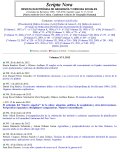Samba schools, national identity and right to the city
Keywords:
samba school, national identity, popular cultureAbstract
Samba schools emerged in the late 1920s, invented and organized by the poorest groups in the city of Rio de Janeiro, which came out of their slums, ghettos and neighborhoods to conquer the great feast of the nation's capital and become, at the end World War II, the most original and well-known symbol of Brazilian national representation. The more traditional interpretations disqualify these great achievements, accusing nationalist movements, political and the populist dictatorship of Getulio Vargas (1937-1945) of ideologically manipulating and controlling samba schools, imposing the development of plots in favor of an official, nationalistic and patriotic discourse suited to domination. In this article we radically oppose these interpretations, showing that this domination was relative, that the problem of development of national issues are a more complex issue, and, finally, that the transformation of samba and samba schools in mean of national representation was a strategy to conquer and to impose carnival to the city and society. Here we narrate a rare and beautiful victory of the vanquished.Downloads
Issue
Section
Articles
License
Los autores que publican en esta revista están de acuerdo con los siguientes términos:
- Los autores conservan los derechos de autoría y otorgan a la revista el derecho de primera publicación, cin la obra disponible simultáneamente bajo una Licéncia de Atribución Compartir igual de Creative Commons que permite compartir la obra con terceros, siempre que estos reconozcan la autoría y la publicación inicial en esta revista.
- Los autores son libres de realizar acuerdos contractuales adicionales independientes para la distribución no exclusiva de la versió de la obra publicada en la revista (com por ejemplo la publicación en un repositorio institucional o en un libro), siempre que se reconozca la publicación inicial en esta revista.





